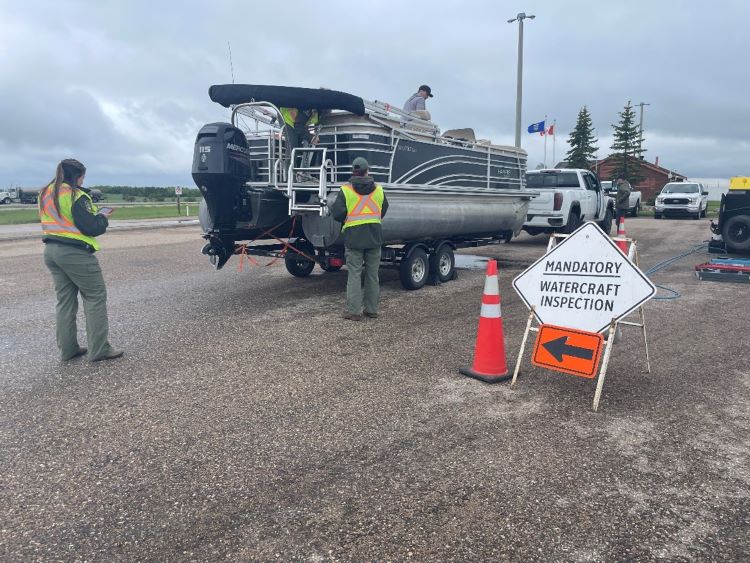Currently, Alberta is zebra and quagga mussel free, but these tiny invaders can easily spread through boats and other watercraft travelling across borders. If established in Alberta, aquatic invasive species can spread rapidly, clog waterways and infrastructure, harm ecosystems and cause hundreds of millions in damages.
Alberta’s government is stepping up. Starting June 20, fines will increase from $324 to $4,200 for failing to stop with a trailered boat at an open inspection station, and fines will rise from $180 to $600 for failing to remove a bilge plug when transporting a watercraft on a roadway. This will help make sure that boats are properly drained, inspected and invasive-species-free before entering Alberta.

Alberta officials inspect incoming boats for invasive species. (Photo credit: Government of Alberta)
"Zebra mussels and other invasive species can devastate Alberta’s rivers, lakes and waterways. We are setting the highest fines in North America because we want everyone to take inspection and detection seriously. Alberta is currently zebra and quagga mussel free so let’s keep ’em out."
Reports of aquatic invasive species are increasing across Canada and the United States. The province must use every tool possible to prevent damage from aquatic invasive species, which could cost millions annually to lakes, waterways and irrigation infrastructure. A recent study estimated that introducing invasive mussels into Lake McGregor alone could cost $284 million a year in damages. Lake McGregor is part of a larger interconnected system that includes reservoirs and irrigation infrastructure in southern Alberta.
“Watercraft inspections are mandatory in Alberta, and these fines will help make sure that boaters follow the rules. The best way to prevent invasive species from getting established is for all people coming into the province to do their part by making sure their drain plug is removed and stopping at inspection stations.”
“Every year, boat inspection stations identify several boats entering Alberta contaminated with invasive mussels. Increasing fines for failing to stop with a trailered boat at an inspection station will help ensure that all boats coming into Alberta are inspected and mussel-free. Prevention is the most effective way to prevent mussels from establishing and destructively impacting Alberta’s waterbodies.”
Higher fines are part of Alberta’s increased border defense. The government has also launched a new Aquatic Invasive Species Task Force and invested $2.5 million to increase the number of inspection stations, add more inspectors, and keep stations open as long as possible.
Alberta continues to call for stronger federal actions to stop invasive species at the Canada-United States border.
Quick facts:
- Some aquatic invasive species, such as zebra and quagga mussels, can survive for nearly 30 days out of water.
- Watercraft inspections have been mandatory in Alberta since 2015. In 2023, 38 boaters received charges or warnings for failure to stop at an open inspection station and six received charges or warnings for transport a watercraft with the drain plug still in.
- The increased fine totals include the 20% Victims of Crime Fund automatic surcharge imposed on a person convicted of an offence under provincial laws unless otherwise excluded in bylaws or regulations.
- In 2023, Alberta inspected 8,818 boats, 19 of which were confirmed positive for invasive mussels.
- 17 of the boats came from Quebec, Ontario and Manitoba.
- Two of the boats were coming from Michigan and Minnesota.
- 11 of the boats were headed to final locations in British Columbia, seven to Alberta, and one to Alaska.
- The increased 2024 Aquatic Invasive Species Watercraft Inspections and Decontamination Program:
- expanded the number of fixed inspection stations to seven and launched a new roving crew
- increased the number of dedicated watercraft inspectors to 50, from 35 last year
- started opening stations in April, with all stations now open through the September long weekend, and many extending beyond this period.
Related information
- Watercraft inspections
- Letter from Alberta’s environment minister calling for increased federal action
Related news
- New task force to stop invasive mussels at the border (May 15, 2024)
- Keeping Alberta invasive mussel free (March 28, 2024)